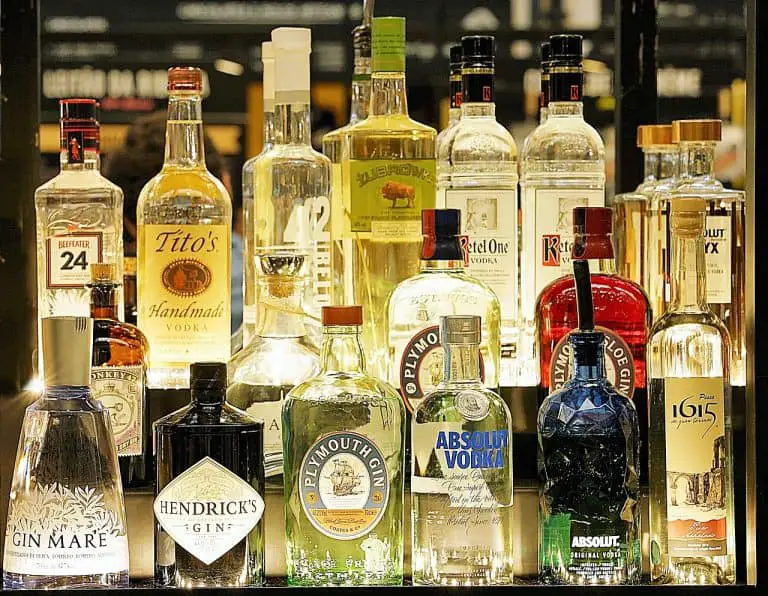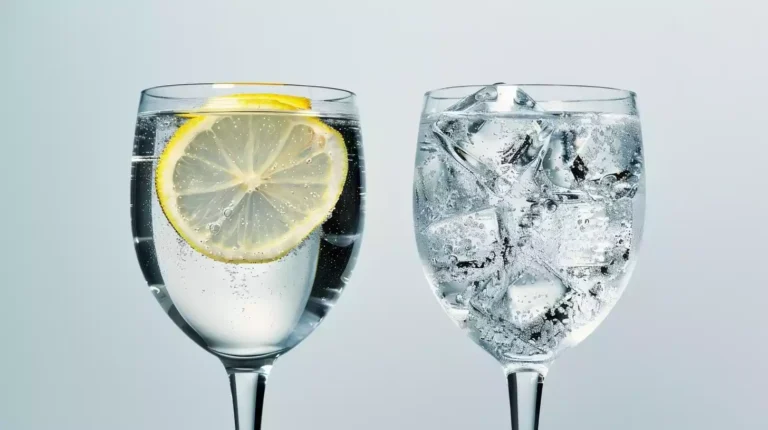Gin & Tears: Why Does Gin Make You Sad or Cry (with Facts!)
I’ve felt the blues with gin because its high alcohol content works like a mood downer. That spirit messes with emotions, making tears flow easily. Gin’s depressant effects on the brain can intensify sadness, especially if you go all in.
The more you drink, the more your emotions might spiral down. It’s like a rollercoaster ride for your feelings, with gin as the driver.
If you want to understand more about why gin causes such emotional havoc, there’s more to discover.
Main Points Covered Below
- Gin’s depressant effects intensify emotions like sadness and despair.
- Compounds in gin, such as terpenes, may contribute to emotional effects.
- Alcohol’s sedative properties interact with the central nervous system, affecting mood.
- Excessive gin consumption can lead to chemical imbalances influencing emotions.
- Personal factors like stress or mental health issues can be exacerbated by gin.
Gin and Emotional Responses
When sipping on gin, one may find themselves unexpectedly overwhelmed with tears and sadness, a phenomenon reported by Public Health Wales and Kings College London. It’s quite intriguing how this popular spirit can evoke such powerful emotional responses.
Nearly a quarter of gin drinkers experience tearfulness after indulging in this drink, which has a long-standing association with melancholy, going back to the 17th century when it was dubbed ‘Mother’s ruin’ due to its perceived negative effects on mood.
The connection between gin and sadness may also be influenced by the circumstances in which it’s typically consumed. Often enjoyed in solitary settings, gin can make individuals reflect on their emotions, leading to feelings of despair.
Despite these somber associations, some positive experiences like increased confidence and sensuality have also been linked to gin consumption, which could be partly attributed to clever advertising strategies.
Gin seems to have a unique way of tapping into our emotions, sometimes bringing tears and melancholy, while other times enhancing our spirits with a touch of confidence and sensuality.
Alcohols Depressant Effects
Alcohol’s depressant effects can have a significant impact on our emotions, serving as a trigger for feelings of sadness or despair. When gin, with its high alcohol content, enters the system, it acts as a downer, influencing our emotional responses.
Understanding how alcohol’s sedative properties interact with our central nervous system is essential in comprehending why it may lead to tears or a sense of melancholy.
Alcohols Downer Effects
Gin’s high alcohol content serves as a depressant, affecting the central nervous system and emotional regulation. When consumed, it can intensify emotions like sadness and despair, leading to tearfulness.
The downer effects of gin are magnified when consumed rapidly or in large quantities, potentially triggering feelings of melancholy. These depressant properties contribute to a sense of introspection and heightened emotional states, making it easier to feel overwhelmed by sadness.
As the alcohol acts as a depressant, it can lower inhibitions and amplify existing emotions, sometimes resulting in tears. Understanding how gin’s depressant effects impact emotions is important in recognizing why it can evoke feelings of sadness or even lead to crying episodes.
Impact on Emotions
Participating in gin can greatly influence one’s emotional state due to its potent depressant effects. The high alcohol content in gin can intensify feelings of sadness and despair, leading to tears and heightened emotional responses.
It’s no surprise that nearly one quarter of gin drinkers have reported feeling tearful after consuming this specific alcohol. The historical connection of gin with loneliness and sadness only adds to its reputation for inducing feelings of melancholy.
Understanding the impact of gin as a depressant on emotions is crucial in addressing the emotional reactions that it can evoke. Next, we’ll explore further into the mechanisms through which gin can lead to sadness and tears, shedding light on why this spirit has such a profound effect on our emotions.
Sadness Trigger Mechanism
Consuming gin, especially in large quantities or quickly, can significantly impact one’s emotional state by triggering feelings of sadness and tearfulness due to its powerful depressant effects on the central nervous system.
The high alcohol content in gin acts as a trigger mechanism for these negative emotions, intensifying feelings of despair.
This impact on emotional regulation can lead to emotional outbursts, inducing a sense of loneliness or introspection.
The sedative nature of alcohol further exacerbates these emotions, potentially causing individuals to experience heightened sensitivity and sadness.
It’s important to recognize the relationship between gin’s depressant effects and its ability to influence one’s emotional well-being, as this understanding can help individuals make informed choices about their alcohol consumption to maintain emotional balance.
Central Nervous System Impact
When gin enters the body, it has a direct impact on our brain chemistry, leading to changes that affect how we regulate our emotions. This disruption in emotional regulation can result in feelings of sadness or despair, as the alcohol’s depressant effects alter the neurotransmitter balance.
Understanding these central nervous system impacts sheds light on why gin has the reputation of making us feel blue or shedding a tear.
Brain Chemistry Changes
Gin’s influence on emotional responses, such as feelings of sadness or the urge to cry, stems from the alterations it induces in brain chemistry through the central nervous system. When gin, with its high alcohol content, is consumed, it acts as a depressant that can impact emotions.
The alcohol’s sedative properties directly affect the central nervous system, leading to changes in emotional regulation. These alterations in brain chemistry caused by the alcohol content in gin contribute to emotional responses like feeling sad or tearful.
As the central nervous system responds to the presence of gin, it can result in shifts in emotional states, potentially prompting feelings of sadness or the inclination to cry.
Does the Type of Gin Affect Its Emotional Effects, Such as Making You Sad or Cry?
The emotional effects of gin can vary based on different types of gin. Some people may experience different emotional responses when drinking certain types of gin, including feeling sad or teary. It’s important to be mindful of the effects of different types of gin on your emotions and to drink responsibly.
Emotional Regulation Disruption
Excessive consumption of gin can disrupt emotional regulation by impacting the central nervous system, leading to heightened vulnerability to feelings of sadness or tears. When drinking gin, its high alcohol content acts as a depressant, influencing how emotions are processed and felt.
Here are some key points to keep in mind:
- Alcohol Content: The high alcohol content in gin plays a significant role in affecting emotional responses.
- Emotional Regulation: Consuming large amounts of gin quickly can disrupt emotional regulation, making one more prone to experiencing sadness or tears.
- Central Nervous System: Alcohol, like gin, depresses the central nervous system, which can alter mood and emotional reactions.
- Individual Variability: Emotional reactions to gin may differ among individuals based on factors such as alcohol tolerance and drinking habits.
Neurotransmitter Imbalance
Impacting neurotransmitter balance in the central nervous system, gin can lead to emotional changes. The high alcohol content in gin disrupts the regulation of neurotransmitters linked to mood, like serotonin and dopamine.
These alterations can affect emotional responses, potentially contributing to feelings of sadness or tearfulness after gin consumption.
The central nervous system impact of gin plays a significant role in understanding why this spirit might induce such emotional shifts. By causing a neurotransmitter imbalance, gin creates a biochemical environment that can influence how we feel, sometimes leading to unexpected emotions like sadness or crying.
Being aware of these effects can help individuals make more informed choices about their alcohol consumption, considering not only the taste but also the potential impact on their emotional well-being.
Emotional Regulation Disruption
The disruption of emotional regulation caused by gin consumption can lead to heightened feelings of sadness or despair. This emotional rollercoaster can be quite overwhelming and may catch you off guard.
Here are a few key points to keep in mind:
- Heightened Sensitivity: Gin’s impact on emotional regulation can make you more sensitive to triggers that wouldn’t typically affect you as strongly.
- Difficulty in Coping: Managing emotions becomes challenging when gin disrupts your emotional regulation, making it harder to bounce back from sad thoughts.
- Increased Vulnerability: You might find yourself feeling more vulnerable and exposed emotionally after consuming gin, which can intensify feelings of sadness.
- Longer Recovery Time: Recovering from a bout of tearfulness or despair induced by gin may take longer due to the disruption in emotional regulation processes.
Understanding how gin affects your emotional well-being is essential in handling its impact on your mental state. Being aware of these emotional disruptions can help you make informed choices about consuming gin and how it may influence your mood.
Gins Alcohol Content Influence
After discussing the emotional disruptions caused by gin consumption, let’s investigate how gin’s alcohol content influences these reactions. Gin typically contains a high alcohol content, often ranging from 37.5% to 50% ABV (alcohol by volume).
This high alcohol concentration can act as a depressant, affecting emotional regulation by impacting the central nervous system. When consumed in large quantities or quickly, gin’s depressant effects intensify, potentially leading to feelings of sadness or tears. The sedative properties of alcohol in gin contribute to these emotions, especially when consumed excessively.
Understanding the influence of gin’s alcohol content on emotional responses is vital in comprehending why it may evoke such reactions in some individuals.
| Key Points | Details |
|---|---|
| Alcohol content | Typically ranges from 37.5% to 50% ABV, acting as a depressant on the central nervous system |
| Emotional regulation | Impacted by the high alcohol concentration, potentially leading to feelings of sadness |
| Depressant effects | Intensified when consumed in large quantities or quickly, affecting emotional responses |
| Central nervous system | Alcohol’s sedative properties contribute to feelings of melancholy or despair |
Lowered Inhibitions and Outbursts
Lowering inhibitions and triggering emotional outbursts, gin consumption can greatly alter one’s behavior and reactions. When the high alcohol content in gin kicks in, it’s like a wave washing over your inhibitions, leaving you more susceptible to emotional outbursts. Here are some ways gin can impact your emotions:
- Heightened Sensitivity: Gin’s high alcohol content can act as a depressant, intensifying emotions and making you more emotionally reactive.
- Increased Impulsivity: Lowered inhibitions from gin can lead to impulsive behavior, causing you to act on emotions without much restraint.
- Vulnerability to Tears: The emotional impact of gin may result in sudden outbursts of tears or feelings of sadness, possibly due to its historical association with melancholy.
- Intensified Introspection: Consuming gin alone may intensify feelings of despair or introspection, magnifying any underlying emotions you may be experiencing.
Responsible Alcohol Consumption
Embracing mindfulness in alcohol intake allows for a more balanced and conscious approach to consumption. Understanding the emotional effects of different compounds found in alcoholic beverages is essential for responsible alcohol consumption. Public Health Wales emphasizes the importance of recognizing how alcohol can impact emotions, influencing our behavior and choices.
Different types of alcohol can trigger varied emotional responses, affecting individuals in diverse ways. By being aware of these emotional implications, we can make more informed decisions about our alcohol consumption. This knowledge helps prevent excessive drinking and promotes safer habits.
Being mindful of how alcohol affects our emotions can lead to more thoughtful and intentional drinking practices. It enables us to choose beverages that align with our emotional well-being, fostering a healthier relationship with alcohol. Ultimately, understanding the emotional effects of alcohol is vital for maintaining a positive and responsible approach to consumption.
Understanding Alcohols Sedative Nature
Alcohol, like gin, has a sedative nature that can impact our emotions and mood. The high alcohol content in gin depresses the central nervous system, affecting how we feel.
Understanding this sedative effect is key to comprehending why gin can sometimes make us feel sad or tearful.
Alcohol and Emotions
Understanding alcohol’s sedative nature involves recognizing its impact on emotional responses and behavior. Gin’s high alcohol content can act as a depressant, affecting emotional regulation and potentially leading to feelings of despair.
When it comes to alcohol and emotions, it’s important to take into account how different types of alcohol, like gin, can evoke specific feelings due to their varying alcohol content.
- Gin can make people feel more tearful or sad compared to other spirits.
- The depressant nature of gin influences emotional responses.
- Consuming gin in large quantities can intensify feelings of sadness or introspection.
- Understanding how alcohol content affects emotions is essential in managing emotional well-being while consuming gin.
Brain Chemistry Effects
Gin’s impact on brain chemistry as a depressant is crucial in understanding its sedative nature. When we ingest gin, its sedative properties come into play, affecting our central nervous system and emotional regulation. This indicates that gin can influence how we process and react to emotions, potentially leading to feelings of sadness or tears.
The depressant effects of alcohol in gin become more prominent when consumed in large amounts or rapidly, heightening the risk of emotional outbursts and reduced inhibitions. By grasping the brain chemistry effects of gin, we gain insight into why it has the ability to evoke such emotional responses.
Let’s explore how these brain chemistry effects translate into our mood swings when consuming gin.
Impact on Mood
Feeling a wave of tranquility wash over me, I can’t help but notice how gin’s high alcohol content acts as a depressant, subtly influencing my mood. Here’s how it impacts me:
- Depressant Effect: Gin, being a depressant, slows down my central nervous system, affecting my emotional regulation.
- Emotional Vulnerability: The sedative nature of gin makes me more emotionally vulnerable, potentially leading to feelings of sadness or tearfulness.
- Intensity with Quantity: Consuming gin in large amounts intensifies its depressant effects, increasing the likelihood of experiencing despair.
- Understanding the Connection: Recognizing gin’s sedative properties helps explain why it can trigger feelings of sadness or tears in some individuals.
Emotional Consequences of Excessive Gin
Experiencing heightened tearfulness and feelings of sadness is a common consequence of consuming excessive amounts of gin, as supported by research findings. When indulging in gin excessively, the high alcohol content and rapid stimulating effects can lead to emotional vulnerability and introspection.
I’ve found that individuals who engage in heavy gin consumption may encounter intensified negative emotions, plunging into a sense of despair. The emotional aftermath of excessive gin intake often involves a deepening sense of loneliness and melancholy, making it a challenging experience for many.
Studies suggest that gin’s link to sadness and tears is particularly noticeable among those who consume it in large quantities. It’s important to be mindful of these emotional consequences when enjoying gin, as excessive consumption can have a significant impact on one’s mood and overall well-being.
Coping Strategies for Negative Emotions
Engaging in relaxation techniques like deep breathing or meditation can effectively manage the negative emotions associated with excessive gin consumption. When coping with feelings of sadness or tears after drinking gin, it’s essential to have a variety of strategies in place. Here are some helpful coping mechanisms:
- Seek Social Support: Reach out to friends or loved ones to talk about your emotions and gain perspective on your feelings.
- Consider Professional Help: If feelings of sadness or crying persist, consulting a therapist or counselor can provide valuable support and guidance.
- Practice Self-Care: Engage in activities like exercise, hobbies, or journaling to enhance emotional well-being and cope with negative emotions effectively.
- Limit Alcohol Intake: Focus on healthier coping mechanisms and reduce alcohol consumption to minimize the emotional impact of gin on your mood. Remember, it’s vital to prioritize self-care and seek help when needed to navigate through challenging emotions.






